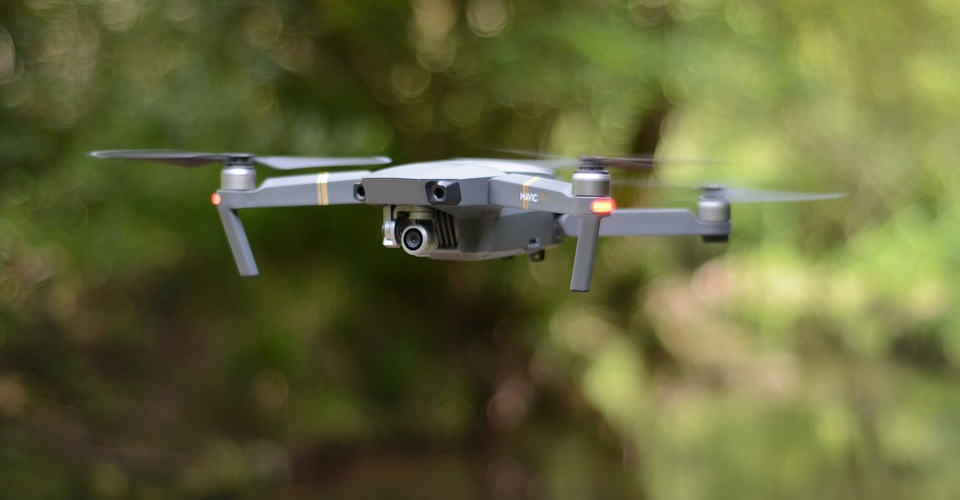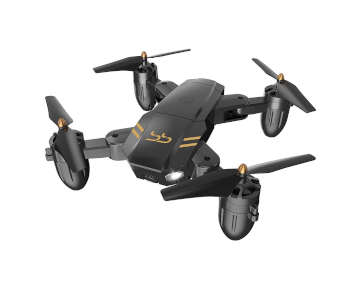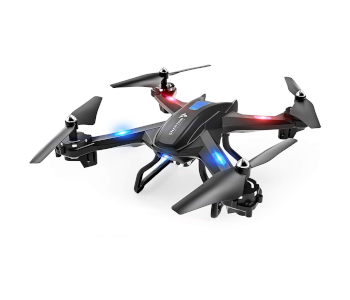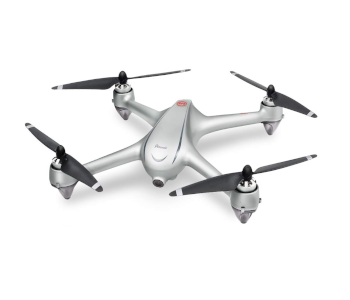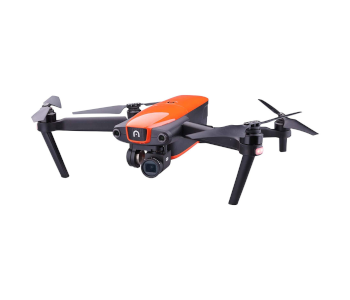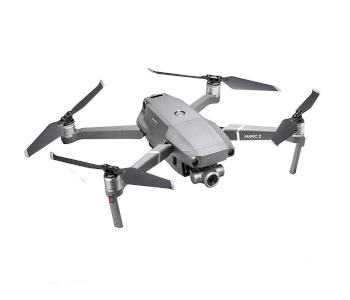9 Best Drones with Cameras
This guide looks at 9 of the best drones with cameras. I’ve divided them into 3 categories, i.e., budget, mid-range, and high-end. Keep reading if you want some help to make the best buying decision. Or, jump to the reviews if you know all about drones and cameras and only want to explore the top picks.
Every camera quad can fly, take aerial photos, and shoot video, but they’re all different. There are 5 things to consider before you buy any new camera drone:
- Price; set your maximum budget to help narrow down choices
- Availability and cost of spare parts and accessories
- Reputation; what do current owners think of the model?
- Camera; quality and capability
- Any flight features that matter to you
| Budget |
|---|
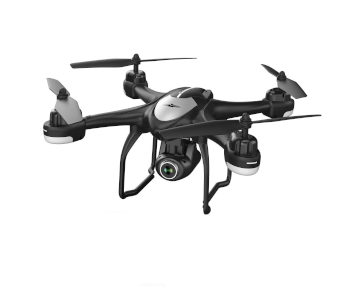 |
| Potensic T18 |
| 4.6/5.0 |
| Max Range: 984 ft. (300 meters) |
| Max Flight time: 10 minutes |
| Headless mode, altitude hold, 1-key takeoff/landing, return to home (RTH). |
| Check Amazon |
| Best Value |
|---|
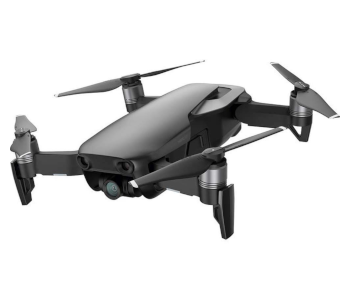 |
| DJI Mavic Air |
| 4.5/5.0 |
| Max Range: 2.4 miles (4 km) |
| Max Flight time: 21 minutes |
| Multiple flight modes, obstacle avoidance, long range, internal storage. |
| Check Amazon |
| Top Pick |
|---|
 |
| DJI Inspire 2 |
| 4.3/5.0 |
| Max Range: 4.3 miles (7 km) |
| Max Flight time: 27 minutes |
| Long flight time, onboard FPV camera, incredible speeds. |
| Check BH |
Make a Simple Checklist
Even budget-end quadcopters come feature-packed these days. Drone pilots at different levels have separate wants, needs, and model expectations though. Get to know what yours are and write them down. For example, a raw beginner may need novice-friendly flight features. The common ones include 1-key takeoff/landing, headless mode, altitude hold, and return-to-home (RTH).
Most pilots have an interest in flight times, battery charging times, and the cost of spares. And camera quality and capability can differ significantly between models.
What to Expect with Drone Cameras
You can buy an aerial photography drone for less than 50 dollars. You can’t expect it to produce cinematic-quality footage, though. But cheap camera drones are an excellent introduction to aerial filming and photography. Mid and high-end drones can stream seamless HD footage to a screen or VR goggles. First Person View (FPV) cameras put drone pilots in the virtual pilot’s seat.
Drone Camera Resolution
It’s true, 4K resolution is becoming the new norm with drone cameras, but is it better? Well, it may not matter as much as you think. A 4K camera has 4x as many pixels (3840 x 2160) as the familiar 1080p (1920 x 1080). That means the video displays greater detail. However, the difference is negligible when viewed on smaller screens unless you zoom in. Plus, 1080p video is easier to edit.
Camera resolution matters more to semi-pro and professional drone pilots. That’s because they sell quality and display work in larger formats. Cheap drones typically are only 720p, but even that’s viewable. It won’t win you any awards, but it’s acceptable for newbies as they learn the ropes.
Gimbal Stabilization
Modern drones are smooth fliers. Despite that, a camera still needs a gimbal to produce footage that’s free from blur and shakes. The 3-axis brushless variety is the best. Gimbals are mechanical anti-vibration devices that help to stabilize the camera in flight. Some are separate units that include a camera mount. Others are complete units that have the camera integrated into the design.
Field and Angle of View (FOV/AOV)
Consider the camera’s field of view (FOV). You’ll sometimes see FOV used interchangeably with AOV (angle-of-view). There are differences though they’re rarely recognized. So, we’ll treat them as the same thing as the sales pages do. View angles refer to how much scene the lens captures. Drones can have wide, ultra-wide, and even fish-eye angles. Make sure the camera’s AOV meets your needs.
Fixed and Detachable Drone Cameras
Some quads have fixed, built-in cameras and others have detachable ones. The latter gives you more choice. For example, you can remove the camera to lighten the payload if you only want to fly. Or, you may be able to attach a better camera of your choice to the mount. Drone cameras can have fixed or adjustable angles. And the lenses can be the zoom variety or of a fixed focal length.
These are the things to consider with drone cameras. I highlight the main specs and any other features in each of the mini reviews. I also mention areas where they don’t shine where appropriate.
About My ‘Drones with Camera’ Reviews
I chose the 9 camera quadcopters in this guide with great care. They’re all favorites within their selected category and worthy of a space on this page. I also considered feedback from real user reviews and the opinions of industry experts. I’ve arranged the camera drones by price, lowest to high, for each category. The table below shows the quads along with a couple of camera details.
Drones with Camera Comparison Table
| Make and Model | Camera | Gimbal | Price |
|---|---|---|---|
| ScharkSpark Beginner’s 720p Camera Drone | 720P FPV | None | Check Price |
| SNAPTAIN S5C WiFi 720P HD FPV Camera Drone | 720P FPV | None | Check Price |
| Potensic T18 FPV GPS 1080P Camera Drone | 1080P FPV | None | Check Price |
| Potensic D80 1080P FPV Camera RC Quadcopter | 1080P FPV | None | Check Price |
| DJI Spark 1080p Camera Quad W/ Remote | 1080P FPV | 2-axis | Check Price |
| DJI Mavic Air 4K Camera Drone Starters Bundle | 4K FPV | 3-axis | Check Price |
| Autel Robotics EVO 4K Camera Drone | 4K FPV | 3-axis | Check Price |
| DJI Mavic 2 24-48mm Optical Zoom Camera Zoom | 4K Zoom FPV | 3-axis | Check Price |
| DJI Inspire 2 | 5.2K Gimbal Camera Compatible Quad | FPV Pilot | 5.2K | Check Price |
3 Best Budget Camera Quads
The 3 camera quads in the Best Budget category are excellent entry-level drones. Consider these models if you’d like to try aerial photography, filming, and experience first person view (FPV).
1. ScharkSpark Beginner’s 720p Camera Drone
Editor’s Rating: 4.7/5
ScharkSpark 720p camera quadcopter is a low-cost beginner model with lots of features. It’s foldable, portable, and an excellent introduction to camera drones.
- Best feature 1: 720p First Person View (FPV) camera
- Best feature 2: Flies indoors or out
- Plus points: Foldable design, 1-key takeoff/landing, app control, tracking mode, altitude hold
- Minus points: Fiddly mobile app, short flight time
Camera Highlights
This is a beginner’s drone and that means mediocre everything, including the camera. Don’t let that deter you as the photos and video are entirely viewable, just not exceptional. The ScharkSpark camera quad is an affordable introduction to aerial photography. You control the camera using a smartphone app. You can also use the phone’s screen to view FPV real-time transmission.
Feature Highlights
The ScharkSpark is small and lightweight, which makes it fun and safe to fly indoors or outside. It’s also foldable, and that means it’s easy to store and highly portable. This little camera quad even fits into a large pocket. The pilot-friendly flight features include 1-key takeoff and landing, 1-key return, and altitude hold. Download the app to your smartphone to explore others like tracking and FPV.
The Not So Good
The flight app can be fiddly to use and needs a more user-friendly control interface. The default app settings aren’t in English either, but switching languages is straightforward. The ScharkSpark has a maximum flight time of only 6 minutes on a single charge. There’s a bonus battery in the box, but 3 or more is advisable considering the 90 minute charging time.
| Tech Specs |
|---|
| Brand: ScharkSpark |
| Dimensions: 7.5 x 7.5 x 2” |
| Camera: 720p FPV |
| Product Weight: 4.16 oz. |
| Max Flight time: 6 minutes |
| Max Range: 262 ft. (80 meters) |
| Battery: 3.7v 650mAh Li-Po |
| Charging time: 90 minutes |
| The Pros |
|---|
| Built-in camera |
| First Person View (FPV) |
| Fly indoors or out |
| App control |
| Foldable/portable design |
| 3 speed settings |
| Headless mode |
| 1-key takeoff/landing |
| Altitude hold |
| LED lights |
| Bonus battery |
| The Cons |
|---|
| Fiddly mobile app |
| Short flight time |
2. SNAPTAIN S5C WiFi 720P HD FPV Camera Drone
Editor’s Rating: 4.5/5
The SNAPTAIN S5C is another excellent choice for entry-level users. It’s an affordable camera quadcopter packed with some easy yet fun flying features.
- Best feature 1: Built-in WiFi FPV 720P HD Camera
- Best feature 2: Gesture control
- Plus points: Easy to fly, prop guards, altitude hold, voice control, app, low signal warning
- Minus points: Short flight time, average camera quality, not stable in the wind
Camera Highlights
SNAPTAIN’s S5C has a built-in WiFi FPV 720p camera. You don’t get outstanding quality, but the stills and video are perfectly viewable. It’s an affordable way to train in aerial filming before progressing to higher-end quads. The little camera can take photos using gesture controls from around 10ft (3m) away. And the live video transmission range is approximately 262ft. (80 m).
Feature Highlights
It’s incredible how much drone makers pack into budget-end quadcopters now. The SNAPTAIN S5C here has prop guards, 1-key takeoff/landing, hand gesture control, voice control, and altitude hold. It even has 3D-VR, and gravity control that lets you fly the drone according to phone movements. You need to download the free Snaptain Era App for iOS or Android for most of these functions to work.
The app also shows the current WiFi status. The low-signal warning alerts you when it gets down to 1 bar. That’s the time to bring the bird back down to earth.
The Not So Good
The battery life for the SNAPTAIN S5C drone is a little over 7 minutes. That’s typical for a camera quad in this category. It comes with 2 batteries which effectively doubles the flight time. Always remember to let the motors cooldown for a few minutes between flights. Camera footage is only average quality, but it does the job. The final negative is that the quad is too light to control in the wind.
| Tech Specs |
|---|
| Brand: SNAPTAIN |
| Dimensions: 13.4 x 13.4 x 3.1” |
| Camera: WiFi FPV 720P HD |
| Field of View (FOV): 60° |
| Product Weight: 4.6 oz. |
| Max Flight time: 7 minutes |
| Max Range: 262 ft. (80 meters) |
| Battery: 3.7v 550mAh Lipo (2) |
| Charging time: 90 minutes |
| The Pros |
|---|
| Built-in FPV camera |
| Easy to fly |
| Gesture control |
| Voice control |
| Gravity control |
| Altitude hold |
| 1-key takeoff/landing |
| Prop guards |
| Low signal warning |
| 3D view mode |
| Bonus battery |
| The Cons |
|---|
| Short flight time |
| Average camera quality |
| Not stable in the wind |
3. Best Budget: Potensic T18 FPV GPS 1080P Camera Drone
Editor’s Rating: 4.6/5
Next up is the Potensic T18 1080p camera quadcopter. It’s the most expensive drone in the Best Budget category, but the included extras justify its price tag.
- Best feature 1: Adjustable wide-angle 1080P camera
- Best feature 2: Follow Me mode
- Plus points: Headless mode, altitude hold, 1-key takeoff/landing, return to home (RTH)
- Minus points: Short battery life (flight time), exaggerated control range
Camera Highlights
The Potensic T18 has a built-in 1080P first person view (FPV) HD WiFi camera. Its wide-angle lens has a 120° field of view (FOV). The camera is also adjustable in up/down directions, which is useful. The quality of the footage is exceptional, considering the price of this bird. Aerial video and stills save directly to a smartphone. The camera also offers first person view (FPV) live streaming.
Feature Highlights
Potensic’s T18 camera quad has what we’ve come to expect of a drone in its class. First-time pilots are sure to welcome its beginner-friendly features. They are 1-key takeoff and landing, a headless mode, altitude hold function, and return to home (RTH). The three RTH are 1-button RTH, automatic low-power RTH, and no signal RTH. And the quad’s Follow Me mode is perfect for hands-free shooting.
The Not So Good
Flight time is only 10 minutes at best, but then we’re still at the budget end. There’s no bonus battery either, so most users will buy at least one extra. The 984ft (300m) range seems exaggerated. The signal tends to drop off much sooner. Make sure GPS mode is active if you plan to test the limits.
| Tech Specs |
|---|
| Brand: Potensic |
| Dimensions: 16.5 x 10.3 x 5.2” |
| Camera: Full-HD 1080P Wi-Fi FPV |
| Field of View (FOV): 120° |
| Product Weight: 2.02 lbs. |
| Max Flight time: 10 minutes |
| Max Range: 984 ft. (300 meters) |
| Battery: 3.7V 1000mAh |
| Charging time: 60 minutes |
| The Pros |
|---|
| Adjustable camera |
| Beginner-friendly flight features |
| Real-time FPV |
| Virtual Reality (VR) mode |
| Follow Me mode |
| Headless mode |
| Altitude hold |
| 1-key takeoff/landing |
| GPS + GLONASS positioning |
| Auto return to home (RTH) |
| App control |
| The Cons |
|---|
| Short battery life |
| Exaggerated control range |
3 Best Value Camera Quads
The next 3 camera drones are the kind pilots progress to after training with entry-level models. The price goes up, but then so do the range of features, camera quality, and flight times.
1. Potensic D80 1080P FPV Camera RC Quadcopter
Editor’s Rating: 4.4/5
The first of the Best Value camera drones is the Potensic D80, powered by 4 brushless motors. It’s the most affordable in this category, but it doesn’t fall short on features or functionality.
- Best feature 1: Built-in 1080P 5G WiFi FPV Camera
- Best feature 2: Follow Me mode
- Plus points: Headless mode, altitude hold, 1-key takeoff/landing, 1-key return alarms
- Minus points: Long charging time, buggy Potensic-M app
Camera Highlights
The D80 is at the lower end of mid-range, so there’s no mechanical gimbal stabilization. Despite that, the footage is quite decent for a quad in its category. The built-in camera is a 5G WiFi enabled 1080p HD model. You save aerial footage to a memory card (not included). It’s also a first person view (FPV) camera. It displays clear, real-time vids and photos to a phone screen up to 984ft away.
Feature Highlights
Filming and photo modes include Follow Me, Point of Interest (POI), and Custom Flight Path. Flying the D80 is a cinch at the entry-level with its headless mode and altitude hold. The one-button functions are 1-key takeoff/landing and return to home (RTH). There’s also auto-return to home for low battery and weak signal. The remote controller also beeps to alert pilots as an extra precaution.
The Potensic D80 has a reasonable 20 minute flight time on a single charge. Its control distance is 2600ft (792m). And the live video transmission has a range of 1000ft (305m).
The Not So Good
The charging time is awful at around 5 hours. The battery pack has a modular design, so it’s quick and easy to swap if you want to invest in spares. The Potensic-M app is buggy (at the time of writing). Connecting the camera and quad can be hit-and-miss at times. At least software developers can update and improve apps, and they’ll be aware of this issue.
| Tech Specs |
|---|
| Brand: Potensic |
| Dimensions: 16.9 x 5.5 x 11.6” |
| Camera: 1080P 5G WiFi |
| Field of View (FOV): 120° |
| Product Weight: 3 lbs. |
| Max Flight time: 20 minutes |
| Max Range: 2600 ft. (792 meters) |
| Battery: 7.4 V 1800 mAh LiPo |
| Charging time: 300 minutes (5 hrs.) |
| The Pros |
|---|
| Built-in FPV Camera |
| Beginner-friendly quadcopter |
| GPS assisted flight |
| Follow Me mode |
| Headless mode |
| Altitude hold |
| Point of Interest |
| 1-key return |
| 1-key takeoff/landing |
| Warning alarms |
| 3 return to home (RTH) |
| Modular battery |
| The Cons |
|---|
| Long charging time |
| Buggy Potensic-M app |
2. DJI Spark 1080p Camera Quad W/ Remote
Editor’s Rating: 4.7/5
The DJI Spark continues to be a popular mid-range camera quad and the perfect selfie drone. There are 3 ways to control it (see below), which makes this a flexible quad for pilots.
- Best feature 1: 2-Axis gimbal 12MP 1080P camera
- Best feature 2: Compact, travel-friendly design
- Plus points: Palm launch, 3 control options, DJI flight modes, obstacle avoidance, fast flier
- Minus points: Average flight time, expensive batteries, only 2-axis gimbal
Camera Highlights
The DJI Mavic Air has a built-in 2-axis gimbal-stabilized camera with a 12MP 1/2.3” CMOS sensor. It has an f/2.6 aperture and an 81.9° field of view (FOV). This quad is an excellent selfie drone that users can fly and operate using simple hand gestures. DJI’s Mavic Air isn’t a cinematic-quality quad, but it still produces impressive footage. The drone also includes all the favorite DJI shooting modes.
Feature Highlights
DJI’s Spark camera quadcopter is a tiny—yet powerful—drone that’s ideal for travel. The FaceAware facial recognition feature lets you launch this puppy from the palm of a hand. The Spark has three control options, i.e., hand gestures, smartphone/tablet, and controller. The remote can also accommodate your phone to maximize the quad’s full potential.
There are many intuitive shooting and flight modes to choose from. The drone also has a capable 3D obstacle avoidance system built-in. It’s a fast flier too with top speeds up to 32mph.
The Not So Good
The Spark’s 16 minute maximum flight time is disappointing for a drone in this price category. The high cost of extra batteries doesn’t lessen the frustration either. A less serious gripe is that the camera gimbal is only 2-axis. The missing third axis is only an issue when flying and filming at high speeds in the Sport mode. That’s the only time when you notice a bit of camera shake.
| Tech Specs |
|---|
| Brand: DJI |
| Dimensions: 5.6 x 5.6 x 2.16” |
| Camera: 12MP 1080P |
| Field of View (FOV): 81.9° |
| Product Weight: 10.58 oz. |
| Max Flight time: 16 minutes |
| Max Range: 1.2 miles (1.93 km) |
| Battery: 11.4V 1480mAh |
| Charging time: 80+ minutes |
| The Pros |
|---|
| Built-in stabilized camera |
| Compact, travel-friendly design |
| Beginner flier mode |
| Palm launch |
| Hand gesture control |
| Smartphone/tablet control |
| Remote control |
| DJI flight modes |
| Obstacle avoidance system |
| Fast flier in Sport Mode |
| The Cons |
|---|
| Average battery life |
| Expensive batteries |
| Only 2-axis gimbal |
3. Best Value: DJI Mavic Air 4K Camera Drone Go Bundle
Editor’s Rating: 4.5/5
Last of the Best Value camera drones is the DJI Mavic Air. It’s the quad to pick if you have the cash and want to bypass the Spark above. Why? Because it has a better camera, and a lot more to boot.
- Best feature 1: Mechanical 3-axis gimbal-stabilized 12MP 4K camera
- Best feature 2: Compact, travel-friendly design w/ foldable arms
- Plus points: Multiple flight modes, obstacle avoidance, long range, internal storage, fast flier
- Minus points: Average flight time, costly batteries
Camera Highlights
DJI’s Mavic Air has a built-in 3-axis gimbal camera with a 1/2.3” 12MP CMOS sensor. The dynamic range is remarkable considering the small sensor size. The camera has a 24mm fixed f/2.8 auto-focusing lens with an 85° field of view (FOV). It can capture 4k video at 30fps (frames per second). At 2.7K it’s 60fps, and 120fps at 1080p and 720p.
The JPEG images are of high-quality and display impressive details. It’s also possible to shoot in RAW file format for even better quality and image control. And this small camera quad has most of the DJI signature flight and shooting modes.
Feature Highlights
The DJI Mavic Air is also small and portable. This drone has a foldable design, and that includes the controller. Mavic Air’s foldability makes it easier to store and better protected than the Spark. It also has a superior obstacle avoidance system. Control options are gesture, smartphone, and a remote. The latter releases the quads full potential and gives it a control range of 2.4 miles (4km).
This drone has 8GB of internal storage and a memory card slot with a 128GB capacity. And the 40mph top speed in Sport mode lets you reach far away destinations in no time.
The Not So Good
Mavic Air’s flight time is 21 minutes. That’s a vast improvement on the budget-priced drones, but it’s still only average in this class. Charging is reasonably fast at just under an hour, but most pilots will want an extra battery. Unfortunately, DJI Intelligent Flight batteries are expensive. The final con is that it’s hard to get a MicroSD card in and out of the slot.
| Tech Specs |
|---|
| Brand: DJI |
| Dimensions: 6.6 x 7.2 x 2.5” |
| Camera: 3-axis 12MP 4K |
| Field of View (FOV): 85° |
| Product Weight: 15.16 oz. |
| Max Flight time: 21 minutes |
| Max Range: 2.4 miles (4km) |
| Battery: 11.55 V 2970mAh LiPo |
| Charging time: 55 minutes |
| The Pros |
|---|
| Integrated stabilized camera |
| Compact, travel-friendly design |
| Foldable arms |
| Multiple DJI flight modes |
| Obstacle avoidance system |
| Long control range |
| Fast speeds in Sport mode |
| MicroSD card slot |
| 8GB internal storage |
| The Cons |
|---|
| Average flight time |
| Costly batteries |
| Awkward MicroSD card slot |
High-End Camera Quads
The final category is for high-end cinematic-quality camera drones. Most pilots who invest in quadcopters from this group tend to be commercial users and service industries.
1. Autel Robotics EVO 4K Camera Drone
Editor’s Rating: 4.4/5
First on the high-end drones is the Autel Robotics EVO. It’s models like this that are starting to give DJI some serious competition. It looks fantastic, has exceptional performance, and it’s foldable.
- Best feature 1: 3-axis gimbal-stabilized 12MP 4K camera
- Best feature 2: Compact, foldable design
- Plus points: Failsafe, obstacle avoidance, 3.3” OLED remote, long flight time, long range
- Minus points: No default restrictions, overly tight card door, no onboard memory
Camera Highlights
Autel’s EVO boasts a high-quality integrated 3-axis gimbal-stabilized camera. It has a Sony CMOS 1/2.3” Sensor, and an f/2.8 aperture. The 94° field of view (FOV) captures an ultra-wide perspective. The camera can shoot 4K Ultra-HD video at 60fps (frames per second) and 12fps in standard 1080p HD. It takes 12MP aerial stills in single and burst modes.
The EVO also has an auto exposure bracketing (AEB) feature. AEB takes 2 or 3 shots at various exposure values to ensure you get the perfectly exposed photo in tricky light. Photos can save as JPG and DNG file formats and for video its MOV and MP4.
Feature Highlights
Consider the high-quality EVO 4K camera quadcopter if you want a reliable travel-friendly drone. Autel built the EVO to last. All its models go through rigorous flight tests before they leave the factory. The quad includes dual GPS and GLONASS systems for hands-free precision hover. Built-in failsafe features include an auto return to home (RTH) for low-battery and lost signal.
Obstacle detection uses advanced computerized vision systems. They provide forward/rear avoidance with bottom sensors to keep indoor flights and landings accurate. The remote is also worth mention. It houses a 3.3” OLED screen that displays critical flight data. It’s also an FPV display that shows live HD 720p video feed. The quad’s flight time is 30 minutes, and its control range is 4.3 miles (6.9km).
The Not So Good
Experienced pilots may enjoy the lack of flight restrictions with the EVO. For example, there’s no built-in no-fly zones or altitude restrictions like DJI has. Nor does the company force firmware updates on EVO owners. The problem with all this is that it can be potentially dangerous for inexperienced pilots. A couple of other negatives are the absence of built-in memory and an overly tight memory card door.
| Tech Specs |
|---|
| Brand: Autel Robotics |
| Dimensions: 7.8 x 3.8 x 4” |
| Camera: 12MP 4K UHD |
| Field of View (FOV): 94° |
| Product Weight: 30.4 oz. |
| Max Flight time: 30 minutes |
| Max Range: 4.3 miles (6.9km) |
| Battery: 13.05V 4300mAh LiPo |
| Charging time: 30 minutes |
| The Pros |
|---|
| Cinematic quality camera |
| Compact, foldable design |
| Failsafe RTH features |
| Obstacle avoidance system |
| 3.3” OLED controller |
| Long flight time |
| Long control range |
| Supports DCI and UHD formats |
| The Cons |
|---|
| No default restrictions |
| Overly tight card door |
| No onboard memory |
2. DJI Mavic 2 24-48mm Optical Zoom Camera
Editor’s Rating: 4.8/5
The penultimate drone in this guide is the much-loved DJI Mavic 2 Zoom. It’s an incredible high-quality camera quadcopter. DJI aims it at pilots who demand exceptional footage with exciting perspectives.
- Best feature 1: 3-axis gimbal-stabilized 24-48mm optical zoom camera
- Best feature 2: 12MP stills, 4K UHD video
- Plus points: Foldable, gimbal protector, RAW files, long flight time, extended range, fast
- Minus points: Doesn’t have a portrait mode, limited internal storage
12-Megapixel 4K Camera Highlights
The 3-axis gimbal camera sports a 1/2.3” CMOS sensor and has an 83° field of view (FOV). But the Mavic 2’s 24–48mm optical zoom lens is its biggest appeal. Aerial filmmakers can take stills and video in new perspectives and shoot in JPEG or DNG (RAW) file formats.
Being able to zoom-in without getting too close gives pilots access to hard-to-reach places. Also, zooming in and out while flying creates the spectacular Dolly Zoom effect.
Feature Highlights
DJI’s Mavic 2 camera quadcopters are the most talked about drones right now. The Zoom here is a precision engineered flying robot with a compact, foldable design. The quad’s many sensors and AI prevent crashes and collisions. DJI has packed all its automated flight modes and high-tech features into the Mavic 2. It’s a fast flier this one, reaching speeds close to 45mph in Sport mode.
The Zoom has an impressive 5 miles (8 km) control range and over 30 minutes of flight time. And its high-quality gimbal protector keeps the expensive camera and gimbal shielded at all times.
The Not So Good
For some reason—and to the disappointment of Mavic 2 fans—there isn’t a portrait mode. The 8GB internal storage is also a letdown considering the memory this quality quad can take up. High-quality filming can fill the internal memory in less than half a flight. At least there’s a MicroSD card slot that supports cards up to 128GB. Don’t leave home without one.
| Tech Specs |
|---|
| Brand: DJI |
| Dimensions: 18.2 x 12.2 x 9” |
| Camera: 12P 4K optical zoom |
| Field of View (FOV): 83° |
| Product Weight: 32 oz. |
| Max Flight time: 31 minutes |
| Max Range: 5 miles (8 km) |
| Battery: 3850 mAh LiPo |
| Charging time: 90 minutes |
| The Pros |
|---|
| High-quality zoom camera |
| 12MP stills/4K UHD video |
| Gimbal protector |
| Travel-friendly, foldable design |
| Obstacle avoidance system |
| JPEG / DNG (RAW) shooting |
| Long flight time |
| Extended flight range |
| 44.7 mph in Sport mode |
| The Cons |
|---|
| Doesn’t have portrait mode |
| Limited internal storage |
| Expensive flight batteries |
3. Top Pick: DJI Inspire 2 | 5.2K Gimbal Camera Compatible
Editor’s Rating: 4.3/5
DJI’s Inspire 2 is for serious filmmakers. Its dual battery system extends the flight time to 27 minutes. It also provides an extra safeguard if one battery fails. But it is this quad worth its high price tag?
- Best feature 1: Compatible w/ 5.2K gimbal-stabilized cameras
- Best feature 2: Dual battery setup
- Plus points: Long flight time, onboard FPV camera, incredible speeds, obstacle avoidance
- Minus points: Lacks rear and side sensors, high price tag, expensive controller
Inspire 2 Camera Highlights
The DJI Inspire 2 does not come with a Zenmuse camera (see below) unless you choose the kit version. DJI designed an incredible image processing system for this quad called CineCore 2.0. It lets professional filmmakers capture 5.2K video at 4.2Gbps bitrate.
This quad is compatible with high-end Zenmuse X4S and X5S cameras. The X4S has a built-in lens whereas the X5S has Micro 4/3 interchangeable lenses.
Onboard Front-Facing FPV Camera
The Inspire 2 comes equipped with a front-facing first person view (FPV) gimbal-stabilized camera. The advantage of this is to give pilots an uninterrupted view from the front. That’s useful if the mounted X4S or X5S cameras face other directions. The FPV camera is also adjustable from 90° to 45° down.
Zenmuse X5S Gimbal Camera
The Zenmuse X5S is significantly more expensive than the Zenmuse X4S. Interchangeable lenses let filmmakers choose from wide-angle to zoom. The different field of view (FOV) provides new opportunities and dynamic perspective for different cinematic looks. The wide aperture and 4/3” sensor make the Zenmuse X5S ideal for shooting in low light too.
Zenmuse X4S Gimbal Camera
The Zenmuse X4S is much more affordable than the X5S. It’s still a powerful 20MP camera that boasts an Exmor R 1” CMOS sensor. The field of view (FOV) is 84°, which is equivalent to a 24mm prime lens. The camera supports shooting at 14fps (frames per second) in DNG and JPEG file formats.
Feature Highlights
This is a top-quality DJI flying camera for major missions. The Inspire 2 uses magnesium alloy in its build to make it sleek and robust. It’s an exceptional drone for filming fast action. That’s why it can reach a top speed of 67mph (108 km/h). It’s protected in flight with a front/below/above obstacle detection and avoidance system.
Other highlights are the retractable landing gear, dual operator control, and DJI’s Intelligent flight modes. It’s a significant improvement on the older Inspire 1, offering more of everything good.
The Not So Good
DJI’s Inspire 2 is not a hobby quad unless money’s no object. In that case—enjoy. The target buyers are commercial users and service industries. In other words, it either makes the pilot money, or it pays for itself in different ways. It’s still expensive, though, and so is its $700 controller (not included).
| Tech Specs |
|---|
| Brand: DJI |
| Dimensions: 18 x 12 x 21” |
| Included Camera: Onboard FPV |
| Camera compatibility: 5.2K |
| Product Weight: 8.82 lbs. |
| Max Flight time: 27 minutes |
| Max Range: 4.3 miles (7 km) |
| Battery: 22.8V 4280 mAh 6S LiPo |
| Charging time: 90 minutes |
| The Pros |
|---|
| Compatible w/ 5.2K cameras |
| 360 rotating gimbal |
| Dual battery setup |
| Onboard FPV camera |
| DJI’s Lightbridge technology |
| Fast acceleration/top speeds |
| Obstacle avoidance |
| Long flight time |
| Long control range |
| Broadcast Mode |
| ActiveTrack |
| Spotlight Pro |
| TapFly |
| Smart Return Home |
| The Cons |
|---|
| Lacks rear and side sensors |
| High price tag |
| Expensive controller |
Contents
- Make a Simple Checklist
- What to Expect with Drone Cameras
- Drone Camera Resolution
- Gimbal Stabilization
- Field and Angle of View (FOV/AOV)
- Fixed and Detachable Drone Cameras
- About My ‘Drones with Camera’ Reviews
- Drones with Camera Comparison Table
- 3 Best Budget Camera Quads
- 1. ScharkSpark Beginner’s 720p Camera Drone
- Camera Highlights
- Feature Highlights
- The Not So Good
- 2. SNAPTAIN S5C WiFi 720P HD FPV Camera Drone
- Camera Highlights
- Feature Highlights
- The Not So Good
- 3. Best Budget: Potensic T18 FPV GPS 1080P Camera Drone
- Camera Highlights
- Feature Highlights
- The Not So Good
- 3 Best Value Camera Quads
- 1. Potensic D80 1080P FPV Camera RC Quadcopter
- Camera Highlights
- Feature Highlights
- The Not So Good
- 2. DJI Spark 1080p Camera Quad W/ Remote
- Camera Highlights
- Feature Highlights
- The Not So Good
- 3. Best Value: DJI Mavic Air 4K Camera Drone Go Bundle
- Camera Highlights
- Feature Highlights
- The Not So Good
- High-End Camera Quads
- 1. Autel Robotics EVO 4K Camera Drone
- Camera Highlights
- Feature Highlights
- The Not So Good
- 2. DJI Mavic 2 24-48mm Optical Zoom Camera
- 12-Megapixel 4K Camera Highlights
- Feature Highlights
- The Not So Good
- 3. Top Pick: DJI Inspire 2 | 5.2K Gimbal Camera Compatible
- Inspire 2 Camera Highlights
- Onboard Front-Facing FPV Camera
- Zenmuse X5S Gimbal Camera
- Zenmuse X4S Gimbal Camera
- Feature Highlights
- The Not So Good

